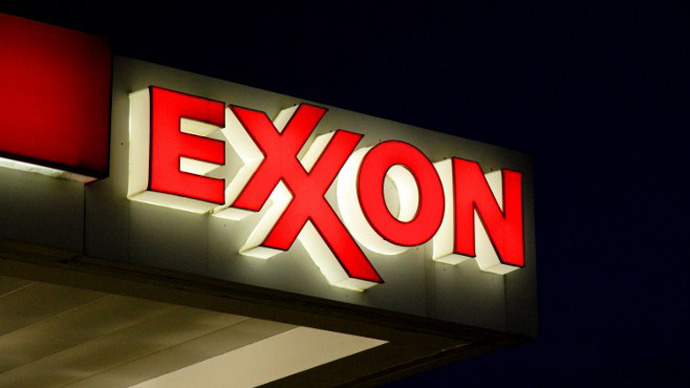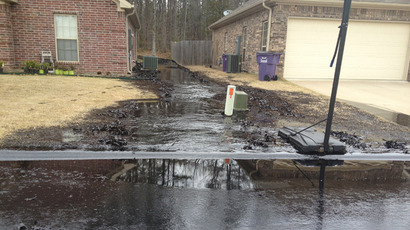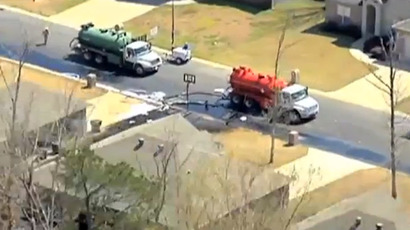ExxonMobil found liable of contaminating New Hampshire

Oil giant ExxonMobil is being asked to pay the state of New Hampshire nearly a quarter-of-a-billion dollars for polluting groundwater with a gasoline additive called MTBE.
Following three months of testimony, a jury deliberated for only 90 minutes on Tuesday morning before finding ExxonMobil liable in a long-running lawsuit involving contamination caused by fuel sold by the multinational oil and gas corporation.
Moments after a decision was reached, an attorney for ExxonMobil told the Associated Press that the verdict had been jeopardized because the oil company was unable to provide the jurors with all the facts. By the time arguments concluded on Monday afternoon, though, jurors had been presented with more than 400 separate exhibits detailing the company’s relationship with using MTBE as far back as 1984.
"We appreciate the jurors' service during this long trial, but erroneous rulings prevented them from hearing all the evidence and deprived us of a fair trial," lawyer David Lender told the AP.
MTBE, or Methyl tert-butyl ether, is an organic compound that’s been used across the world as a fuel additive because it’s a cost-effective way of increasing the octane level in gasoline. A number of spills and other incidents have caused MTBE to contaminate groundwater in some cities, though, and the compound has been banned entirely in California and New York for nearly a decade. New Hampshire outlawed MTBE as a gasoline additive in 2007, and since then the state has warned that residents should not drink any groundwater determined to be containing any more than 13 parts per billion of it.
Lender and other attorneys for the oil giant said that ExxonMobil first started using MTBE in order to come into compliance with Clean Air Act mandates, as the compound has been linked to reducing air pollution. According to them, third parties such as independent gas station owners are responsible for any contamination in New Hampshire, since their inability to control the gasoline was the cause of the spills.
"This is a case about decisions made by the government over 40 years ago," Exxon Mobil attorney James Quinn told WPRI News before the verdict was reached. "The government told Exxon Mobil to get the lead out and we did. They told us to use oxygenates and we did. ... What is the case really all about? It's about hind-sighting, scapegoating, second-guessing and muddling."
That wasn’t an argument bought in full by the jury, though, who agreed this week that ExxonMobil is liable for the damage since they manufactured a defective product and neglected to warn both distributors and consumers alike of the dangers associated by MTBE-contamination. The US Environmental Protection Agency’s Office of Water previously concluded that while the intensity of health risks associated with low exposures to MTBE cannot be ascertained, “MTBE is a potential human carcinogen at high doses.”
“[T]here is little likelihood that MTBE in drinking water will cause adverse health effects at concentrations between 20 and 40 ppb or below,” the EPA found.
During the trial, though, an expert witness called by the state insisted that even a small dose of MTBE would be enough to ruin a water supply.
“You could contaminate a million liters of water to a concentration of 0.4 parts per billion with a single teaspoon of MTBE,” Marcel Moreau, an underground storage systems expert from Maine, testified in January.
In 2008, the US Geological Survey said that contamination, albeit minor, was rampant across New Hampshire.
"In the four counties using reformulated gasoline, we found MTBE at or above 0.2 parts per billion (ppb) in 30 percent of public supply wells and in 17 percent of the private homeowner wells," USGS hydrologist Joseph Ayotte said of the study.
On trial, the state said the number of wells contaminated with MTBE in New Hampshire could range from 600 to over 5,000, even six years after the compound was banned from being imported as a gas additive. And although ExxonMobil might not have been mandated to make sure MTBE was kept out of New Hampshire before then, a jury this week said it should have known better than to market the product for decades despite rising health concerns.
"The finding of Exxon's negligence is particularly important because it shows the jury understood that this problem could have been avoided," Jessica Grant, an attorney for the state, tells AP.
New Hampshire is now asking the company to pay $236 million to monitor and assist in the decontamination of groundwater containing MTBE.














